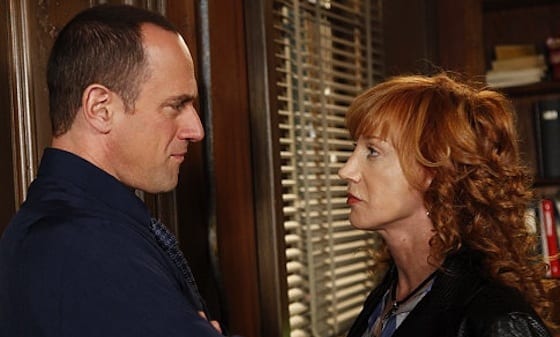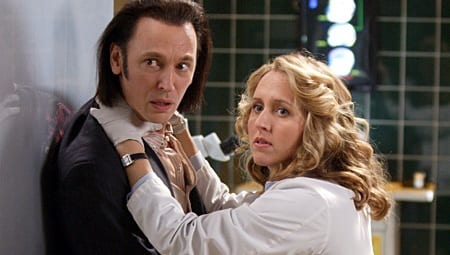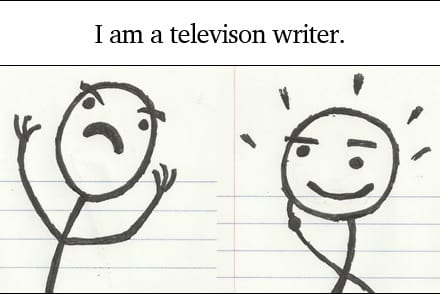An Idiot’s Guide to Establishing Yourself as a TV Writer
by Melissa Byers and Treena Hancock on April 23, 2012 in Writing
The clock reads 4:30 am. It’s dark outside. Must drag ass out of bed and try to look somewhat presentable for the 6:30 am crew call. Must also review scenes for the day and be prepared to answer the barrage of questions from the director and actors: “How do you pronounce octyl-cyanoacrylate?” “The knife should be sticking out of the body, right?” And “My character sounds a little mean. Can you soften these lines?” Ok. Now we’re awake. This is the benefit of being a writing team. Two brains are better than one. Especially before Starbucks. But it’s all in a days work when you’re a writer/producer on a TV series.
We know it sounds like a cliché, but if you can get paid for doing something you love, that makes you the luckiest person on the planet. We consider ourselves to be very lucky people. But we’ve also worked very hard to get here. We come from humble beginnings. Just two friends who started writing together at Ryerson University in Toronto, Canada. We had a professor who believed in us, who helped us believe in ourselves. He taught us that if we wanted to be TV writers, we should watch TV, a lot of it, and most importantly, write. A lot.
Once out of college, we both worked part-time, wrote full time. Movies, sitcoms, one hours. You name it, we wrote it. This helped us figure out that our true passion was in one hour drama. Five years after graduation we landed our first staff job. We were thrilled. It was a period show, Little Men, which was executive produced by Carl Binder, one of the nicest, most talented men we’ve ever worked with. From day one, Carl taught us how to be better writers and how to produce. One very important lesson he taught us was to always be open to notes, because you never know where a good idea might come from. TV is all about collaboration. You’ll probably spend more time with your fellow writers than with your own family. That’s why it’s important to surround yourself with good people, not just good writers.
If you write one genre for a number of years, people in the industry feel that’s all you can write. We wanted to move from family shows to crime drama, but we didn’t have any samples to prove that we could write dark and edgy. We threw ourselves into the genre, writing specs for The Shield and CSI. But most showrunners want to read original material, really get to know your voice, so we wrote a very dark and twisted pilot, called Hog Heaven. We pitched it as Twin Peaks meets Dallas on an organic pig farm. It had lots of sex, violence, and gallows humor. No one called us soft writers after that. In fact, our nickname in the industry now is “The Murder Girls.”

Law and Order: Special Victim's Unit
But that script didn’t land us a staff job. We went two years without being on staff. And money was getting tight. We only had enough to keep our houses for six more months. Our hope was to sell a pilot. We came up with an idea and pitched it to Universal. They liked it, but because we’d never run a show before, they paired us with Robert Nathan, an experienced writer/producer from the Law & Order camp.
Our first time meeting Robert was pretty terrifying. He said he had 32 objections to our idea. Things that needed to be addressed before we pitched to the network. One by one, we found solutions for them and Robert became part of our team. He helped shape our good idea into a great idea and we sold that pilot and got to keep our houses. We learned a lot from Robert, especially about pitching. Even if you’re unsure about what you’re saying, say it with conviction and people will listen. After all, if you don’t believe in your story, why should anyone else?
That pilot helped us land our first job on a crime series, Crossing Jordan. When that finished, we worked on other shows, The Unusuals, Flashpoint, and CSI. Every show gave us the opportunity to work with some pretty incredible people, and to grow as writers and producers.

Crossing Jordan
We’ve made our share of mistakes along the way, like telling our boss his joke wasn’t funny. Sometimes honesty isn’t the best policy. And we’ve recently learned the importance of being careful of how you speak to people in all areas of production. From actors to editors, we’re all craftsmen who take pride in our work, and an offhand comment can be taken as a harsh criticism. When you’re in the editing room, don’t say, “Is there a better take?” It implies the editor put in the shittiest take he could find. Instead, ask, “Is there an alternate take? Or a take where he’s less angry?” Words are powerful. Be careful how you use them.
If you want to be a writer, write. Don’t let anything or anyone stand in your way. Believe in yourself. Believe in your work. Eventually, your hard work (and a little luck) will pay off. We hope we get to work with you one day.

